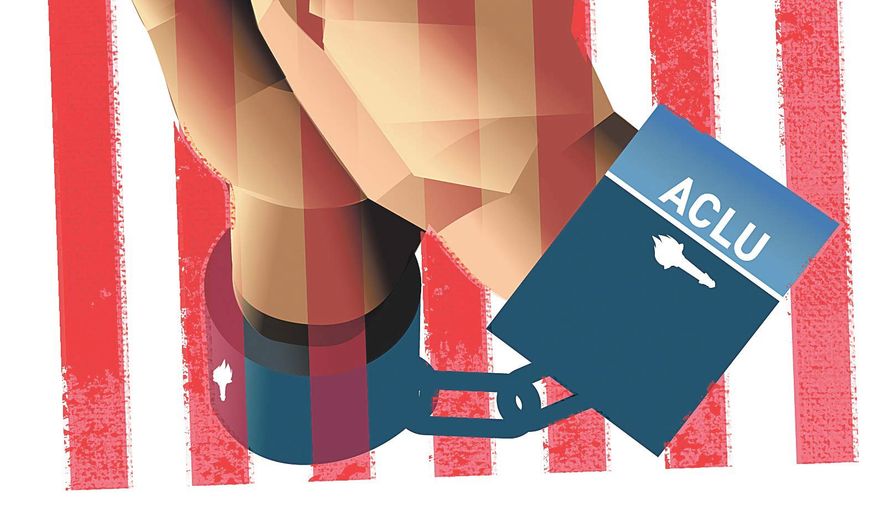OPINION:
We face a crisis of conscience today — a crisis forced upon us by elites in Washington who would pick and choose who is allowed to follow their deeply held beliefs and who is to be punished by the government for doing so.
U.S. Citizenship and Immigration Services recently indicated it is issuing policy guidance expanding the conscientious objector provision exempting new citizenship applicants from affirming, during their naturalization oath, that they will (if required by law) bear arms on behalf of the United States and perform noncombatant service in the U.S. armed forces . While this provision has existed for some time, the new guidance will loosen evidentiary rules and broaden the contours of conscience exemptions: A “deeply held moral or ethical code” can suffice, and the applicant is “not required to belong to a specific church or religion [or] follow a particular theology or belief.”
While some may disagree over whether these changes are legally justified, it is nice to see the Obama administration recognizing protections for the individual’s conscience and religious convictions. After all, that is what is being done here by bolstering the conscientious objector provision.
The United States has had a long and proud history of supporting the individual’s conscience exemption from compulsory military service and other generally applicable requirements in law. Our nation’s highest court affirmed such exemptions when it decided an Amish child could obtain a religious exemption from general school attendance laws, and that a Seventh-Day Adventist’s religious conscience preventing her from working on Saturday must be honored in the face of a state’s generally applied unemployment compensation policy. The government’s move to bolster exemptions from the generally required oath is the latest example in this tradition.
Why then, does the federal government refuse to acknowledge such requests for exemptions in other contexts, such as regarding contraception and abortion, and same-sex marriage? The conscientious objectors are often similarly motivated by religion, and just as sincere. Why did the Obama administration refuse to accommodate the beliefs of the Little Sisters of the Poor and fight these women all the way to the Supreme Court? Why did the solicitor general contemplate revoking the tax-exempt status of conscience-based schools if they decline to approve of same-sex marriage?
It would appear the government wants to pick and choose which religious claims to support based on their content. Indeed, others, such as the American Civil Liberties Union (ACLU), have admitted they discriminate based on the substance of religious claims, and try to defend themselves by arguing no harm comes from the claims they support. They would be better off admitting they want to preserve sexual autonomy above all else, so nothing must interfere with their use and promotion of contraception, ability to abort babies, and free participation in various sexual activities. Anything that gets in the way of these goals, such as marriage structures which have existed for thousands of years, must be eliminated.
If this were not the case, the ACLU and federal government would be supporting people like Jack Phillips, the small-town baker whose claim of religious conscience was recently rejected by the Colorado Court of Appeals. Mr. Phillips was happy to serve gay customers in his bakery; he just didn’t want to provide a wedding cake celebrating their same-sex marriage. They had to buy their cake somewhere else. What real harm comes of this? The objector’s conscience is respected and freedom is protected. Like the conscientious objector framework, another willing participant steps forward to do the job (the new cake maker “read about what happened at Masterpiece Cakeshop” and “wanted to reach out and help”).
Indeed, in such situations there is no harm; there is only offense. And offense in a democracy occurs everywhere, every day, and it is not the law’s job to try to stop it. As Justice Antonin Kennedy reminded us last year, in another case involving religion in the public square, “[o]ffense does not equate to coercion,” and a “violation is not made out any time a person experiences a sense of affront from the expression of contrary religious views.” But instead of supporting this small-town baker’s religious claim, whose conscience objection harmed no one, the ACLU is suing Jack Phillips.
The ACLU and Obama administration support individuals following their deeply held beliefs — if they like the content of those beliefs. Yet religious freedom will be undermined most acutely if we begin to say that some religious beliefs are worthy and others are not. The First Amendment Defense Act currently being considered by Congress provides conscience exemptions based on beliefs about marriage while also ensuring that “benefit[s] or service[s] authorized under federal law” are not denied to those seeking them. What harm comes of this exemption? None. Yet the ACLU and the administration continue to oppose this bill.
The federal government, ACLU and others who pick and choose between religious beliefs need to be honest: Either they must support all religious claims equally, or they must admit they want to promote a free-for-all view of individualized sexuality above all else.
For America’s sake, we must hope for the former.
• Travis Weber is director of the Center for Religious Liberty at the Family Research Council.




Please read our comment policy before commenting.